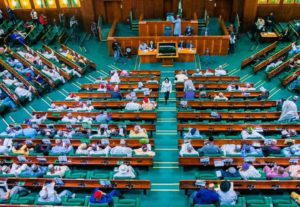 The House of Representatives has instructed the Central Bank of Nigeria (CBN) to suspend its directive on including social media handles as part of the “Know Your Customer” (KYC) requirement for bank customers. This decision was reached following the adoption of a motion by Rep. Kingsley Chinda (PDP-Rivers) and others during the plenary session in Abuja.
The House of Representatives has instructed the Central Bank of Nigeria (CBN) to suspend its directive on including social media handles as part of the “Know Your Customer” (KYC) requirement for bank customers. This decision was reached following the adoption of a motion by Rep. Kingsley Chinda (PDP-Rivers) and others during the plenary session in Abuja.
Chinda emphasized that while the directive may seem commendable, it would impose unnecessary pressure on the Nigerian masses during this challenging period. He argued that the CBN’s directive conflicted with Section 37 of the Constitution of the Federal Republic of Nigeria, 1999, which safeguards citizens’ right to privacy.
The lawmaker pointed out that banks in the country already possess customers’ names, telephone numbers, passport photographs, emails, National Identification Numbers (NIN), Biometric Verification Numbers (BVN), utility bills, and other essential information required to identify and monitor customers. Chinda further highlighted the existence of more effective means for monitoring activities such as money laundering, terrorism financing, and proliferation financing, including the Nigeria Police Force (NPF), Nigeria Financial Intelligence Unit (NFIU), and the Economic and Financial Crimes Commission (EFCC), among others.
Chinda expressed concerns that implementing the CBN’s directive would force Nigerians who are not on social media, particularly those with substantial business turnovers, to either join the platforms or be systematically excluded from formal banking systems. He warned of the negative effects and implications this would have, particularly for illiterate or semi-literate business owners, traders, and entrepreneurs residing in rural areas.
In response to these concerns, the House of Representatives stressed the importance of revisiting and suspending the CBN directive to alleviate the hardships faced by Nigerians. The house assigned the Committee on Banking and Currency (when constituted) to investigate the matter and report back within three weeks for further legislative action. Additionally, the Committee on Legislative Compliance (when constituted) was mandated to ensure the implementation of the directive.

ByteDance Refuses TikTok Sale Despite US Pressure, Plans Legal Challenge
Air Peace Plane Makes Emergency Landing In Lagos Following Fire Warning Indicator
Ajayi Agboola Emerges PDP Flagbearer For Ondo November Gubernatorial Election
119 Inmates Escape As Storm Damages Suleja Custodial Centre